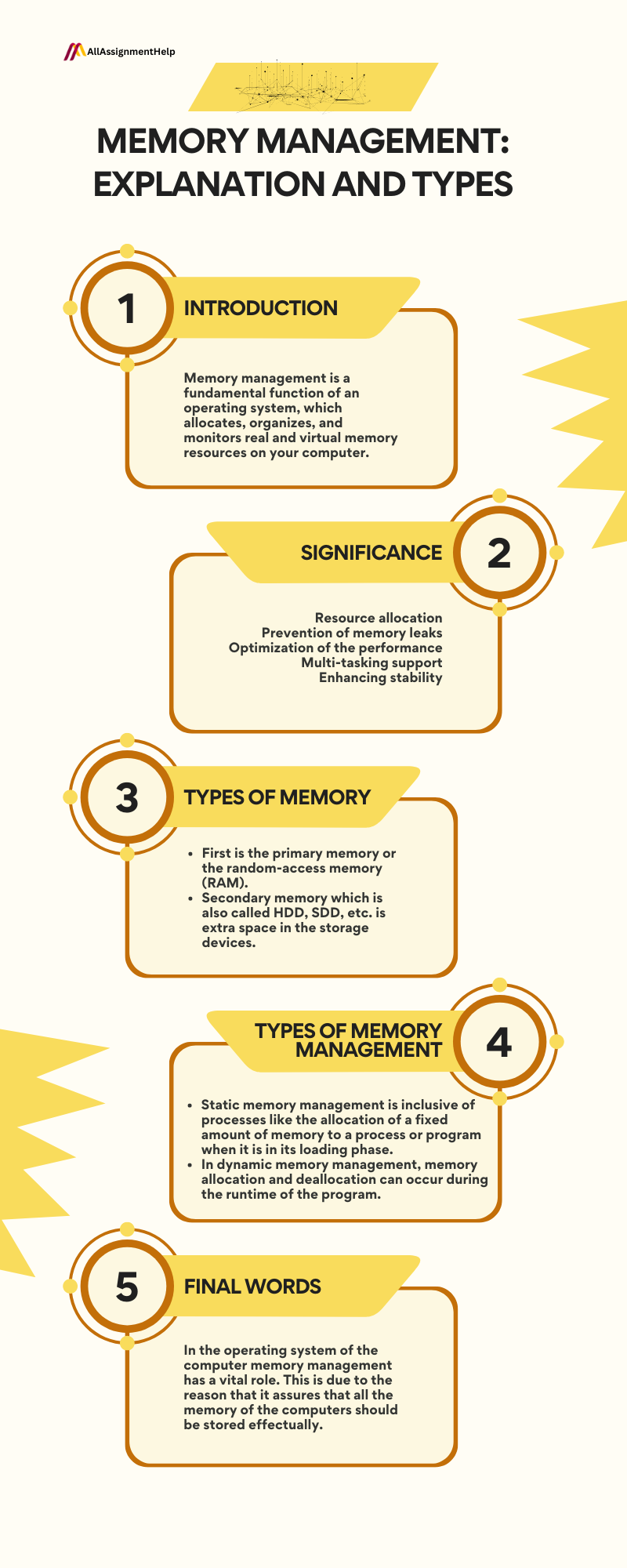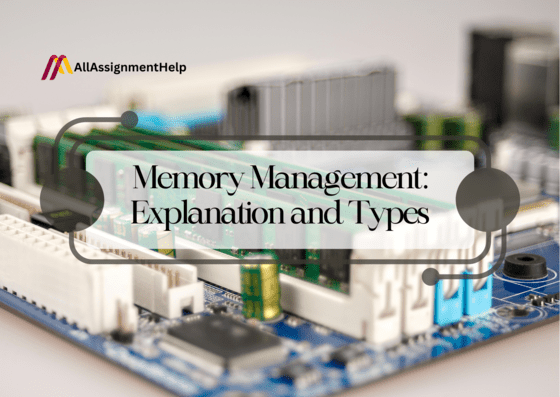Table of Contents
Memory management is a fundamental function of an operating system, which allocates, organizes, and monitors real and virtual memory resources on your computer. Moreover, effective memory management allows several programs and processes to share limited memory resources, resulting in a more responsive and optimized user computing experience.
Furthermore, memory management seeks to guarantee that each operating process and application has access to the memory resources it requires while not interfering with other processes or causing system crashes. Hence, to fulfil this duty, an operating system must keep track of which memory addresses are in use. It provides memory space to new processes as they begin to run and deallocates old processes as they are no longer required. With the help of this blog by All Assignment Help, let us read more about the types of memory management and try to explain it in simpler terms for you.
What is Memory Management?
Memory management is regarded as the type of resource management which applies to computer memory. In accordance with the given context, it can be depicted that memory management is the systematic process in which computer memories are controlled as well as coordinated. Here, different portions are called blocks that are being used for the purpose of running the various programs in order to optimize the overall performance of the system in an effective way.
In the operating system, memory management plays a vital role. This is because; it assures that the memory of the computer should not be filled with the data. Thus, here we will carry out a major discussion on the given aspect only and learn more about the major concepts that are being related to memory management in an efficient way. Additionally, if you are facing trouble in assignments for topic the key areas of memory management, you can let our programming assignment help experts assist you with the same. Now, let us read further on the topic.
Importance of Memory Management
The significance of memory management is undoubtful. There are several reasons why we need memory management and its primary use revolves around the best of memory resources in computers. Also, there are several memory models for memory management. The experts have highlighted some of the key points below.
Resource allocation
When we talk about memory management, we talk about the allocating and deallocating of memory spaces as per the need. Moreover, in order to make our allocation efficient, we need to ensure that we have enough space to execute programs and processes without worrying about interruptions and unnecessary delays.
Prevention of memory leaks
There are times when a program can easily allocate memory. However, it fails to release it after using it, this is when a memory leak tends to take place. Therefore, proper management of memory is a great way to identify and resolve any memory leaks. In this manner, we can also prevent any long-term degradation in the performance of the system and have consistent memory access.
Additionally, to have a good knowledge of memory management you need to have your game strong with numbers. Hence, taking your math class on time is crucial. However, if anything prevents you from taking your class and you are wondering, can I ask anyone to do my math class for me, then let us tell you, it is possible. You can now hire an expert to take your class on your behalf, regardless of the subject matter.
Optimization of the performance
How effectively you have managed your memory will be depicted in the performance of your system. If it is well optimized then your system will work fine. Moreover, with the correct optimization of the allocation of memory and memory deallocation techniques, we can ensure better and improved performance of our systems with reduced resource contention.
Multi-tasking support
In a multi-tasking support system, multiple processes can run concurrently. Moreover, here memory management becomes even more significant. This is to make sure that each process in the system has individual and enough space or memory where it can be operated seamlessly without any interference.
Enhancing stability
There can be instability in the system or it may crash when there is an uncontrolled usage of memory. Hence, we can say that with the help of memory management, we can enhance stability and prevent any kind of underflow, overflow, or any other issues related to the memory, the best of memory safety measures.
Also read: Computer Technology- Meaning, Significance and Career Opportunities

Types of Memory
Before we read more about memory management, let us first understand the types of computer system memory.
- First is the primary memory or the random-access memory (RAM). It is the volatile memory that we use in computer systems to store data and programs that are running actively. Moreover, it helps in the fastest access to the data. However, it loses its content the moment we turn off the power.
- Secondary memory which is also called HDD, SDD, etc. is extra space in the storage devices. Moreover, it can retain data even when the system is not actively running. It is used for long-term data storage.
Also read: Computer Information Technology- Meaning, Significance, and Benefits
Types of Memory Management
Given below are different types of memory management.
Static memory management
Static memory management is inclusive of processes like the allocation of a fixed amount of memory to a process or program when it is in its loading phase. Moreover, throughout the execution of the program, the memory which is allocated tends to remain constant. Furthermore, the approach is simple but it still has limitations. Let us read about it.
Advantages of static memory management
- The allocation and deallocation in the process is simple and straightforward.
- Predictability is higher and any requirement for the memory can be known prior. It helps in resource planning.
Disadvantages of static memory management
- The inefficiency in this memory optimization technique is higher and the memory might come as surplus. Moreover, it results in the inefficient use of resources.
- It has limited dynamic adaptability which means it is not adapted well to the changing memory requirements.
In addition to this, if you are a student learning computers and programming and come across any academic challenge related to your assignments, then you can seek online assignment help from the experts right away. The experts will take the best care of your assignments and provide you with content which is unique and plagiarism-free.
Dynamic memory management
In dynamic memory management, memory allocation and deallocation can occur during the runtime of the program. It is flexible due to which usage of memory resources becomes more efficient. In addition to this, it uses a memory pool which is also known as the heap. In any program’s memory, the heap is the space where the dynamic memory allocation takes place.
Advantages of dynamic memory management
- It enables efficient resource utilization as the memory is distributed with minimum wastage keeping the actual requirements in mind.
- The adaptability of dynamic memory management is excellent as the program can easily adapt to the changing needs of memory during the runtime.
Disadvantages of dynamic memory management
- Dynamic memory management brings complexity which includes proper deallocation of the memory so that any memory leaks can be avoided.
- Over time, dynamic memory allocation can result in memory fragmentation. Here, the free memory gets divided into smaller chunks which makes it tough to allocate contiguous blocks of memory.
In addition to this, if you are facing academic complexity and thinking about who else can take my online class on my behalf, then the answer is experts. Hiring experts online to take your class has become easy now. Regardless of your subject and its complexity, these experts can manage any class for you aligning it with an IP address masking facility to avoid any type of danger in your academic career.
Conclusion
From the whole analysis, it can be concluded that in the operating system of the computer memory management has a vital role. This is due to the reason that it assures that all the memory of the computers should be stored effectually. Further, by having an idea about the main areas of it, the programmer can make an effective decision in relation to the allocation as well as recycling of the memory in an efficient way. Also, by having good knowledge about the concepts of management, the programmer can assess a quick solution to the problem.
Frequently Asked Questions
| Question: What is swapping in memory management? Answer: The very first concept of management is swapping. It is the type of process which is required in memory for the execution purpose. But many times, this happens because there is not enough main memory left with the aim of holding all the active processes in the timesharing type of system. |
| Question: What is the drawback of automatic memory management? Answer: The memory here is retained, but it is of no use for the users. At present, there is very limited availability is being seen in relation to the memory manager. |
| Question: Why is manual memory management useful? Answer: For the programmer, it is very much easier to get an idea of what is exactly going on. Moreover, there is some manual memory manager that tends to perform better when they are short of memory. |
